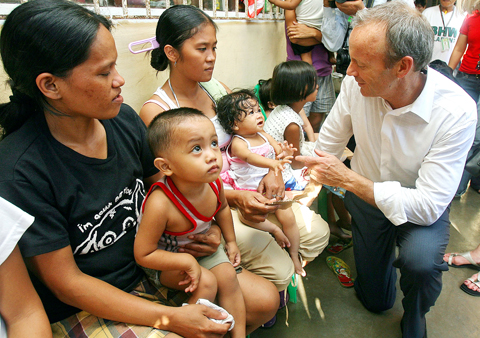More than 1 million victims of deadly storms in the Philippines may be suffering from mental stress and need psychological help, the WHO said yesterday.
Shin Young-soo, WHO regional director for Western Pacific, said that while it was normal for flood and landslide victims to experience anguish, those feelings needed to be addressed.
“Many of these people will be anxious and distressed after the experience they have gone through,” he said.

PHOTO: EPA
“That is a perfectly normal reaction, but the danger is they might become frustrated and angry if their physical and mental needs are not taken care of as the days go by,” he said.
Shin said among the signs of deteriorating mental state include sleeplessness, antisocial behavior and suicidal tendencies.
“This is about the time when we might be seeing worrying reactions such as these,” he said. “Government officials and relief workers should be on the lookout for signs.”
Nearly 1,000 people were killed by back-to-back storms Ketsana and Parma that triggered massive flooding and landslides in the Philippines in late September and early last month.
More than 8 million people have been affected by the storms.
The WHO said more than 1 million people were still living in floodwaters, with little prospect of the flood receding before the end of the year.
“Tens of thousands of people are at risk from leptospirosis, a bacterial disease caused by contact with water contaminated with urine from rats and other mammals,” a WHO statement said.
“Other health threats include cholera, dengue fever, malaria, diarrhoea, skin rashes and respiratory illnesses,” it said.
The organization also warned of psychological stress on relief workers, many of whom have been working seven days a week since the storms struck.
“Confronting danger and human misery for days on end, often without proper rest, exacts a heavy emotional toll on these people,” Shin said.
Shin said emergency workers can sometimes be so overwhelmed by the scale of disaster and by the suffering they witness their performance becomes significantly impaired.
He said if relief workers showed signs of burnout, they should be allowed to withdraw.
“A dysfunctional helper is no help to anyone,” Shin said.

When Shanghai-based designer Guo Qingshan posted a vacation photo on Valentine’s Day and captioned it “Puppy Mountain,” it became a sensation in China and even created a tourist destination. Guo had gone on a hike while visiting his hometown of Yichang in central China’s Hubei Province late last month. When reviewing the photographs, he saw something he had not noticed before: A mountain shaped like a dog’s head rested on the ground next to the Yangtze River, its snout perched at the water’s edge. “It was so magical and cute. I was so excited and happy when I discovered it,” Guo said.

Chinese authorities said they began live-fire exercises in the Gulf of Tonkin on Monday, only days after Vietnam announced a new line marking what it considers its territory in the body of water between the nations. The Chinese Maritime Safety Administration said the exercises would be focused on the Beibu Gulf area, closer to the Chinese side of the Gulf of Tonkin, and would run until tomorrow evening. It gave no further details, but the drills follow an announcement last week by Vietnam establishing a baseline used to calculate the width of its territorial waters in the Gulf of Tonkin. State-run Vietnam News

TURNAROUND: The Liberal Party had trailed the Conservatives by a wide margin, but that was before Trump threatened to make Canada the US’ 51st state Canada’s ruling Liberals, who a few weeks ago looked certain to lose an election this year, are mounting a major comeback amid the threat of US tariffs and are tied with their rival Conservatives, according to three new polls. An Ipsos survey released late on Tuesday showed that the left-leaning Liberals have 38 percent public support and the official opposition center-right Conservatives have 36 percent. The Liberals have overturned a 26-point deficit in six weeks, and run advertisements comparing the Conservative leader to Trump. The Conservative strategy had long been to attack unpopular Canadian Prime Minister Justin Trudeau, but last month he

Four decades after they were forced apart, US-raised Adamary Garcia and her birth mother on Saturday fell into each other’s arms at the airport in Santiago, Chile. Without speaking, they embraced tearfully: A rare reunification for one the thousands of Chileans taken from their mothers as babies and given up for adoption abroad. “The worst is over,” Edita Bizama, 64, said as she beheld her daughter for the first time since her birth 41 years ago. Garcia had flown to Santiago with four other women born in Chile and adopted in the US. Reports have estimated there were 20,000 such cases from 1950 to